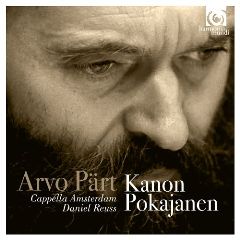Arvo Part - Kanon Pokajanen (2016)
Arvo Part - Kanon Pokajanen (2016)

01. Kanon pokajanen - Ode I 02. Kanon pokajanen - Ode III 03. Kanon pokajanen - Ode IV 04. Kanon pokajanen - Ode VI 05. Kanon pokajanen - Kontakion 06. Kanon pokajanen - Ikos 07. Kanon pokajanen - Ode VIII 08. Kanon pokajanen - Ode IX 09. Kanon pokajanen - Prayer after the canon Cappella Amsterdam Daniel Reuss - conductor
Arvo Pärt's Kanon Pokajanen of 1997 has become one of his most popular works, perhaps because, although it fits broadly into the bell-like "tintinnabular" style of the main part of his career, it is a bit less abstract than many of his other works. The "kanon" of the title is not a musical canon, but a collection of sacred texts, here a group of repentance prayers of the Orthodox church, in the old Church Slavonic language. The music is a cappella and connected to the text, and as such, it naturally contains contrasts that set parts of the text off in basic ways even as static sonorities are maintained for long stretches. Pärt himself indicated that in the Kanon, he "wanted the word to be able to find its own sound, to draw its own melodic line," to which one might add in order to "build its own larger shapes" as well. The work is thus suited well to the sound of the Cappella Amsterdam under Daniel Reuss, not one of the usual choirs that interpret Pärt with a maximum of purity, but add expression and just a bit of vocal heft. The results are impressive and carry a sense of the ecstasy inspired by the very best Pärt performances. Sample anywhere, but check in first with one of the responsorial Odes (perhaps "Ode VI"), and note the care that has been taken with the unfamiliar text and language by the performers. Another major attraction is the sound of Amsterdam's Waalse Kerk, ideal for this music. A highly recommended entry in the Pärt catalog. ---James Manheim, AllMusic Review
On paper this disc isn’t an easy sell: it’s an hour of a cappella choral music, mostly revolving around a fairly repetitious pattern without much variety or deviation, revolving around themes of penitence and repentance. Yet I found it utterly spellbinding and entirely compelling.
Arvo Pärt has found an unusual degree of fame for a contemporary composer through his minimalist textures and his Orthodox mysticism. He’s from the same eastern European mystical school as the likes of Henryk Górecki, and their music’s appeal comes from similar roots. If more of Pärt’s oeuvre has found popularity then it’s probably thanks to his more widespread adoption by film and TV directors, but his religious faith has been at the centre of his identity since his conversion to Orthodoxy in the early 1970s.
Kanon Pokajanen, composed as a commission to commemorate the 750th anniversary of Cologne Cathedral, sets a long canticle text, the Canon of Repentance, by Andrew of Crete. The text consists of a series of odes with interjections and a final prayer, and the helpful booklet notes explain more about the structure of Orthodox canticles in general, as well as giving the full texts and translations.
The theme is almost universally one of sorrow for sin and beseeching God’s mercy, and Pärt echoes the constant theme of his text with a steady musical treatment that varies only very slightly as the work progresses through its hour-long time span. Repetition is both its mainstay and the key to its success. The choir takes a vocal nugget, latches onto it and sings it again and again and again, in classic minimalist style, often with the sopranos singing the melody while the basses sing a drone underneath. Often there is some interplay between unison and harmony, or a change in melodic structure, but very little alteration to the melody.
If that sounds dull, however, it’s anything but. Pärt uses his structure to cast a spell over the listener, working his profound religious faith out through his music and making it as compelling to the listener as it clearly is to the composer. The basics of Orthodox plainchant and prayer are all there, but the composer makes them entirely his own, and I was totally convinced. I began by following the words as I listened, but after only a short while I put the words aside and simply surrendered myself to the music, entering a near-mesmerised state before long.
The performance, too, is very good. The Cappella Amsterdam, who recently gave us such an excellent Brahms disc, here give the most convincing impression of an eastern Orthodox choir that I think I’ve ever heard from a group of western Europeans. The upper voices are tight and totally on the note, while the basses anchor the whole performance with their dark, dreamy drone that is so intrinsic to the work’s success. They never once sound like tourists in this repertoire, and I was convinced throughout. The roomy acoustic helps, too, so that the resonance of the sound is every bit as much a part of the performance as the notes sung by the choir.
So unless you’re totally allergic to Pärt’s minimalist style, I think this is a disc that will repay exploration. As Gilles Saint Arroman’s booklet notes say, “Here it seems as if time no longer counted, as if we are approaching the Time of God – Eternity… Hence, in a sense, the Kanon Pokajanen marks out a path towards divine communion.” If that doesn’t make you want to explore, then I’m not sure what will. ---Simon Thompson, musicweb-international.com
download (mp3 @320 kbs):
yandex mediafire mega uloz.to 4shared cloudmailru gett








